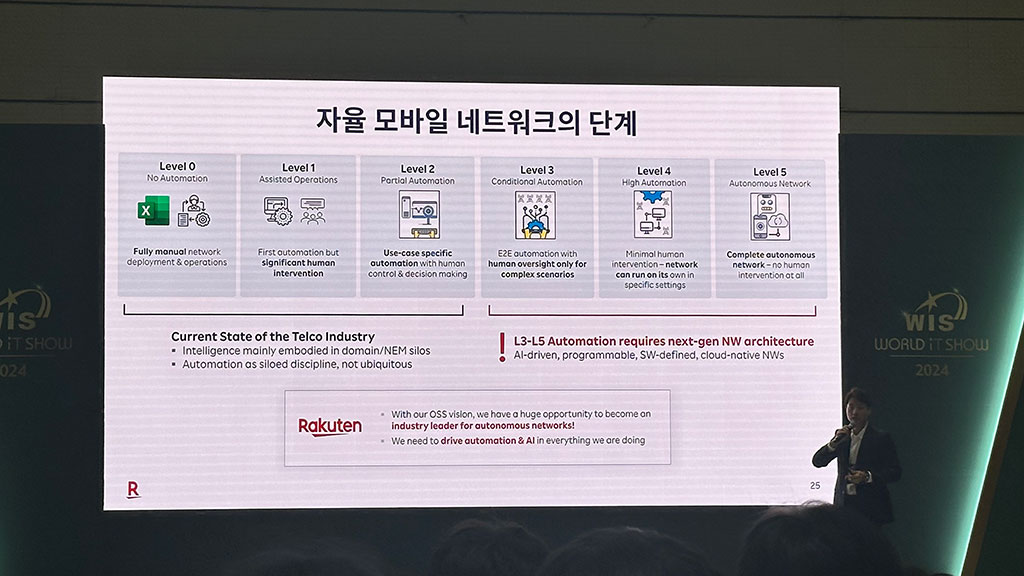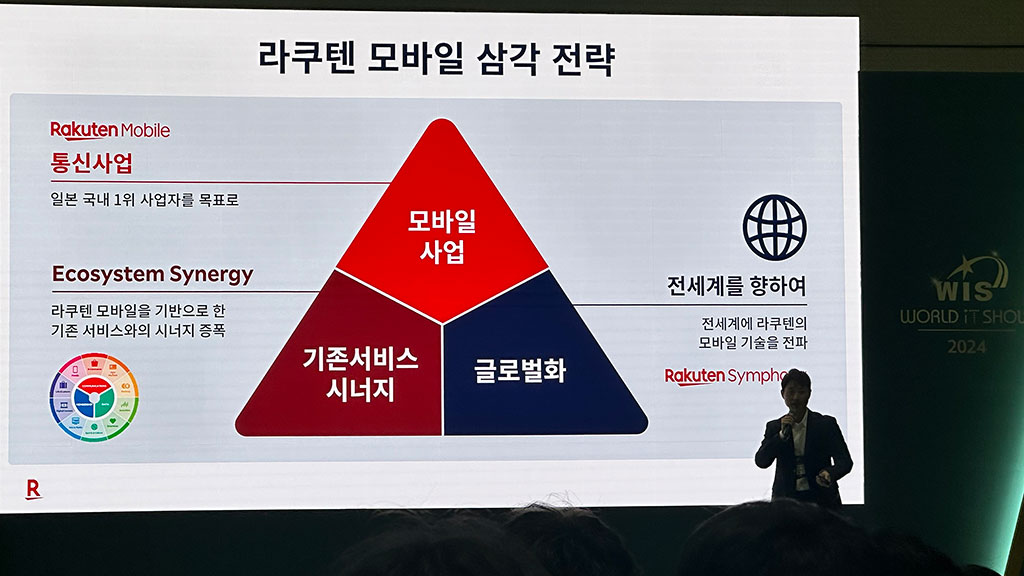▲라쿠텐심포니코리아 손승연 대표
日 제4이통사 우뚝…오픈랜 기반 전국망 99% 지원
글로벌 통신사 AI 자율 모바일 네트워크 달성 목표
전 세계 최초 오픈랜 기반 5G 전국 네트워크를 실현한 라쿠텐모바일이 통신사업 중심으로 기존 서비스를 확대하고 있다.
17일 개막한 과기부 주최 ‘2023 월드IT쇼’에서 라쿠텐심포니코리아(Rakuten Symphony) 손승연 대표는 ‘국경을 넘는 혁신: AI가 주도하는 전국망 오픈랜 5G 네트워크’를 주제로 발표했다.
다양성과 통합을 강조하는 라쿠텐 그룹의 통신기업 ‘라쿠텐 모바일’은 일본의 네 번째 공식 통신사업자로, 일본 국내 1위 사업자를 목표로 기존 서비스와 연결 및 글로벌 고객을 확보하고 있다.
라쿠텐 모바일의 시장 전략은 네트워크의 가상화에 있다. 라쿠텐 모바일은 전 세계 최초 오픈랜(Open RAN) 기반의 5G 전국 네트워크를 실현했다. 일본 내 약 6만여개의 4G 기지국과 1만여개가 넘는 5G 기지국을 보유하고 있다. 손 대표는 “2020년 1분기에 시작해 불과 약 3년만에 기지국을 설치해 일본 인구의 98.8%(4G), 파트너 네트워크까지 더하면 약 99.9%를 자체 네트워크로 커버할 수 있었다”고 말했다. 또한 독일 알뜰폰 기업 ‘1&1’에 2021년 8월부터 지난해까지 오픈랜 5G 전국망 구축에 성공한 바 있다고 소개했다.
라쿠텐심포니는 라쿠텐 모바일의 자회사로, 클라우드 기반의 모바일 기술들을 제공하며 이커머스, 증권사 등 80개의 서비스를 통합 제공하고 있다. 손 대표는 “라쿠텐심포니는 통신 사업과 기존 서비스의 시너지가 증폭돼 상품 판매 비중이 늘고 매출이 성장했다”고 소개했다. 라쿠텐심포니는 수퍼앱 ‘링크’를 통해 모바일 가입자를 관리해 서비스를 통합 지원한다.

라쿠텐모바일이 통신 시장에서 경쟁력 확보를 위해 채택한 오픈랜 기술은 무선 통신장비의 HW와 SW를 분리하고, 프런트홀 인터페이스와 기지국의 OS를 개방형으로 표준화함으로써 서로 다른 제조사의 장비의 상호 연동을 가능케 하는 기술이다.
오픈랜의 도입은 낮은 비용과 초고속 운영이 가능하다는 특장점이 있다. 통신장비를 소프트웨어화 함으로써 업데이트만으로 기지국 연결이 가능해서 부동산 및 HW 교체 비용을 절감할 수 있다. 또한 HW의 종속성을 탈피해 가격 경쟁력을 확보했다. 기존에는 장치 간 연결 시 통신장비 제조사를 통일해야 했으나, API의 개방성을 특징으로 하나의 장비에 종속되지 않게 됐다. 유연성을 확보하고 독점 제조사의 가격 상승을 피할 수 있다는 설명이다.
라쿠텐모바일은 ‘통신 AI’ 전략을 펼치고 있다. AI 기반 모바일 네트워크를 전국 100% 자동화 하겠다는 목표다. 사용자는 통신 네트워크상에 장애가 발생할 시 AI 기반 자동으로 탐지 및 해결할 수 있는 서비스를 제공받는다.
예컨대 테슬라의 자율주행차가 레벨 3을 달성한 후, 레벨 5에 도달해 로봇 택시 서비스를 선보이겠다고 밝혔듯이 통신에도 자율 모바일 네트워크 단계가 있다. 자동화가 제공되지 않는 0단계와 운영 수준의 1단계부터, 일부 자동화가 된 2단계가 있다. 3단계부터는 차세대 네트워크 기술을 요구한다. 복잡한 시나리오를 위한 E2E 자동화가 이뤄진 3단계, 인간 개입이 소수가 되는 4단계, 최종적으로 네트워크 자동화가 이뤄진 5단계가 그 뒤를 따른다.
손 대표는 “현재 자율 네트워크 수준은 2단계에 있으며, 라쿠텐심포니 모바일은 자율 모바일 네트워크 5단계를 목표하며 현재는 3-4정도 사이에 있다고 본다”며, “전 세계 통신사를 시작하는 기업을 대상으로 생산성과 효율을 높여주고 있다”고 덧붙였다.

